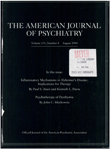Visual hallucinations in patients with macular degeneration
Abstract
OBJECTIVE: This study was undertaken to determine the prevalence of visual hallucinations in patients with macular degeneration, describe such hallucinations phenomenologically, and possibly determine factors predisposing to their development. METHOD: Using a case-control design, the authors screened 100 consecutive patients with age-related macular degeneration for visual hallucinations. Each patient with visual hallucinations was matched to the next three patients without hallucinations. The patients and comparison subjects were compared in terms of scores on the Beck Depression Inventory, Eysenck Personality Questionnaire, Telephone Interview for Cognitive Status, and a structured questionnaire including demographic characteristics, family history, and medical and psychiatric history. Ophthalmologic data were obtained by chart review. RESULTS: Of the 100 patients, 13 experienced visual hallucinations. Four variables were significantly associated with having hallucinations: living alone, lower cognition score, history of stroke, and bilaterally worse visual acuity. Hallucinations were not associated with family or personal history of psychiatric disorder or with personality traits. In 11 (84.6%) of the 13 patients, the hallucinations had begun in association with an acute change in vision. CONCLUSION: These results indicate that visual hallucinations are prevalent among patients with macular degeneration. They appear unrelated to primary psychiatric disorder. The predisposing factors of bilaterally worse vision and living alone support an association with sensory deprivation, while history of stroke and worse cognition support a decreased cortical inhibition theory.
Access content
To read the fulltext, please use one of the options below to sign in or purchase access.- Personal login
- Institutional Login
- Sign in via OpenAthens
- Register for access
-
Please login/register if you wish to pair your device and check access availability.
Not a subscriber?
PsychiatryOnline subscription options offer access to the DSM-5 library, books, journals, CME, and patient resources. This all-in-one virtual library provides psychiatrists and mental health professionals with key resources for diagnosis, treatment, research, and professional development.
Need more help? PsychiatryOnline Customer Service may be reached by emailing [email protected] or by calling 800-368-5777 (in the U.S.) or 703-907-7322 (outside the U.S.).



